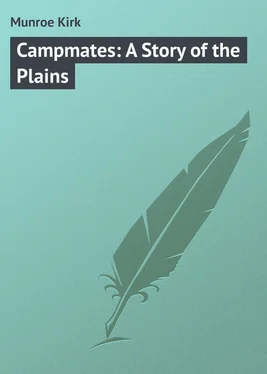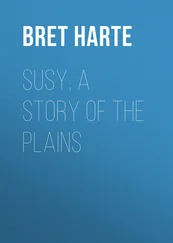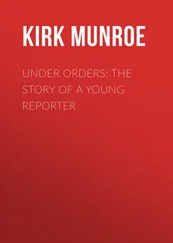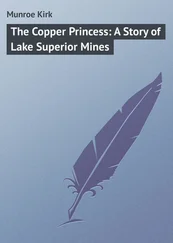Kirk Munroe - Campmates - A Story of the Plains
Здесь есть возможность читать онлайн «Kirk Munroe - Campmates - A Story of the Plains» — ознакомительный отрывок электронной книги совершенно бесплатно, а после прочтения отрывка купить полную версию. В некоторых случаях можно слушать аудио, скачать через торрент в формате fb2 и присутствует краткое содержание. Жанр: foreign_prose, foreign_children, на английском языке. Описание произведения, (предисловие) а так же отзывы посетителей доступны на портале библиотеки ЛибКат.
- Название:Campmates: A Story of the Plains
- Автор:
- Жанр:
- Год:неизвестен
- ISBN:нет данных
- Рейтинг книги:4 / 5. Голосов: 1
-
Избранное:Добавить в избранное
- Отзывы:
-
Ваша оценка:
- 80
- 1
- 2
- 3
- 4
- 5
Campmates: A Story of the Plains: краткое содержание, описание и аннотация
Предлагаем к чтению аннотацию, описание, краткое содержание или предисловие (зависит от того, что написал сам автор книги «Campmates: A Story of the Plains»). Если вы не нашли необходимую информацию о книге — напишите в комментариях, мы постараемся отыскать её.
Campmates: A Story of the Plains — читать онлайн ознакомительный отрывок
Ниже представлен текст книги, разбитый по страницам. Система сохранения места последней прочитанной страницы, позволяет с удобством читать онлайн бесплатно книгу «Campmates: A Story of the Plains», без необходимости каждый раз заново искать на чём Вы остановились. Поставьте закладку, и сможете в любой момент перейти на страницу, на которой закончили чтение.
Интервал:
Закладка:
Mr. Matherson could hardly restrain his delight at the prospect of such an opening for the boy whom he loved so dearly; but he was too honest to let him start out under false colors; so he said,
"I can never tell you how grateful I am for this offer, sir; but I don't want you to think that my boy is any better than he really is. He is not a good scholar, and seems to lack application. Even now he is in danger of being turned back a whole year in school because he has failed to keep up with his class."
"I know all that," replied Mr. Hobart, smiling; "and it is one of the reasons why I want him to go with me. I was very much such a boy myself, and think I understand his state of mind perfectly. He has reached the most trying period of his life, and the one where he most needs encouragement and help. He has a sufficiently good education to build on, and is bright enough to comprehend things that are clearly explained to him. As for his having no knowledge of the peculiar studies necessary for an engineer, I am glad that he hasn't. I believe that it is better for all boys to gain some practical knowledge of the business they intend to follow before they really begin to study for it. A few months or a year of practice shows them in what they are deficient and what they need to learn. I could get plenty of young fellows to go out to Kansas with me who are crammed with theoretical knowledge of surveying and engineering, but who are ignorant of its practice. Such chaps think they know it all, and are impatient of criticism or advice. I can get along better with one who knows little or nothing to begin with, but who is bright and willing to learn. In the end I will guarantee to make such a one the more valuable engineer of the two."
"It is a new idea to me," said Mr. Matherson, reflectively, "but I believe you are right."
"There is another reason why I fancy your boy, and think I can make an engineer of him," continued Mr. Hobart. "His physical condition seems to me to be perfect. As they say of prize animals, he seems to be sound in wind and limb, and without a blemish. Now, the life of an engineer, particularly in unsettled countries, is a hard one. He is exposed to all sorts of weather; must often sleep without a shelter of any kind, and must work hard from early dawn until late at night, sometimes on a scanty allowance of food. It is as hard as, and in many cases harder than, active service in the army. It is no life for weaklings, and we do not want them; but, from what I have seen of your boy, I do not believe that even you can point out any physical defect in his make-up."
"No, I certainly cannot," replied Mr. Matherson, heartily, glad of a chance to praise his boy without qualification, in at least one respect. "I believe him to be physically perfect, and I know that there is not a boy of his age in town who is his match in strength, agility, or daring."
"So you see," laughed the engineer, "he is exactly the boy I want; and if you will let him go with me I shall consider that you have conferred a favor."
"Of course I will let him go, sir, and shall feel forever grateful to you for the offer."
Thus it was all settled, and Glen was summoned to hear the result of the few minutes' conversation by which the whole course of his life was to be changed. By it, too, he was to be lifted in a moment from the depths of despondency and uncertainty to such a height of happiness as he had not dared dream of, much less hope for. The moment he entered the room he was assured, by the smiling faces of its occupants, that their topic of conversation had been a pleasant one; but when its nature was explained to him he could hardly credit his senses.
Would he like to go out to Kansas for the summer? – to a land still occupied by wild Indians and buffalo? The idea of asking him such a question! There was nothing in the whole world he would like better! Why, it was almost as good as the position offered to Binney Gibbs; and, certainly, no boy could ever hope for anything more splendid than that. In two respects he considered himself even more fortunate than Binney. One was that he was to go with Mr. Hobart, whom he had come to regard with an intense admiration as one of the wisest and kindest of men. The other was that they were to start on the third day from that time, while Binney would not go for nearly two weeks yet.
What busy days the next two were! How Glen did fly around with his preparations! How interested Mr. Hobart was, and how he laughed at many of the excited boy's questions! Ought he to have a buckskin suit and a broad-brimmed hat? Should he need any other weapons besides a revolver and a bowie-knife? Would it be better to take long-legged leather boots or rubber-boots, or both? How large a trunk ought he to have?
His outfit, prepared by Mr. Hobart's advice, finally consisted of two pairs of double blankets, rolled up in a rubber sheet and securely corded, two pairs of easy, laced walking-shoes, and one pair of leather leggings, three flannel shirts, three suits of under-clothing, and six pairs of socks, one warm coat, two pairs of trousers, a soft, gray felt hat, half a dozen silk handkerchiefs, and the same number of towels. Of these he would wear, from the start, the hat, coat, one of the flannel shirts, one of the two pairs of trousers, a suit of under-clothing, one of the silk handkerchiefs knotted about his neck, and one of the pairs of shoes. All the rest could easily be got into a small leathern valise, which would be as much of a trunk as he would be allowed to carry.
He would need a stout leather belt, to which should be slung a good revolver in a holster, a common sheath-knife, that need not cost more than thirty cents, and a small tin cup that could be bought for five.
Besides these things, Mrs. Matherson, who loved the boy as though he were her own, tucked into the valise a small case of sewing materials, a brush, comb, cake of soap, tooth-brush, hand-glass, and a Testament in which his name was written.
On the very day of his departure his adopted father presented the delighted boy with a light rifle of the very latest pattern. It was, of course, a breech-loader, and carried six extra cartridges in its magazine. In its neat canvas-case, Glen thought it was the very handsomest weapon he had ever seen, and the other boys thought so too.
With them he was the hero of the hour, and even Binney Gibbs's glittering prospects were almost forgotten, for the time being, in this more immediate excitement.
Of course they all gathered at the railway station to see him start on the morning of the appointed day. It seemed as though almost everybody else in the village was there, too. Binney Gibbs was among the very few of Glen's acquaintances who did not come. So, amid tears and laughter, good wishes and loud cheerings, the train rolled away, bearing Glen Eddy from the only home he had ever known towards the exciting scenes of the new life that awaited him in the far West.
Chapter VII
ACROSS THE MISSISSIPPI
Never before, since he was first carried to Brimfield as a baby, had Glen been away from there; so, from the very outset, the journey on which he had now started, in company with Mr. Hobart, was a wonderful one. In school, besides history, he had enjoyed the study of geography, being especially fond of poring over maps and tracing out imaginary journeys. In this way he had gained a fair idea of the route Mr. Hobart and he were to pursue, as well as of the cities and other places of interest they were to see. There was one place, however, for which he was not prepared. It was early in the first night of the journey, and the boy had just fallen into a doze in his sleeping-car berth. As the night was warm, and there was no dust, the car door was open, and through it came a sudden shout of "Glen Eddy! Glen Eddy!"
Читать дальшеИнтервал:
Закладка:
Похожие книги на «Campmates: A Story of the Plains»
Представляем Вашему вниманию похожие книги на «Campmates: A Story of the Plains» списком для выбора. Мы отобрали схожую по названию и смыслу литературу в надежде предоставить читателям больше вариантов отыскать новые, интересные, ещё непрочитанные произведения.
Обсуждение, отзывы о книге «Campmates: A Story of the Plains» и просто собственные мнения читателей. Оставьте ваши комментарии, напишите, что Вы думаете о произведении, его смысле или главных героях. Укажите что конкретно понравилось, а что нет, и почему Вы так считаете.












